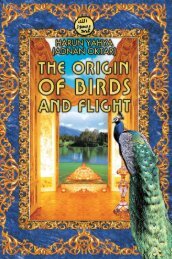Islam, the Qur'an and the Arabic Literature
Islam, the Qur'an and the Arabic Literature
Islam, the Qur'an and the Arabic Literature
You also want an ePaper? Increase the reach of your titles
YUMPU automatically turns print PDFs into web optimized ePapers that Google loves.
that awaits <strong>the</strong>m require a higher speed appropriate to censuring <strong>and</strong><br />
warning. [33]<br />
The varying speeds which Taha Husayn mentions appear to be achieved with<br />
remarkable spontaneity, which is <strong>the</strong> result, in Taha Husayn’s words, of ’a<br />
careful selection of words <strong>and</strong> expressions.’ [34] He gives sura 26, al-<br />
Shu’ara’, as an example of <strong>the</strong> type of verse requiring speedy reading, <strong>and</strong><br />
sura 28, al-Qasas, as an example of that requiring slow reading.<br />
Ano<strong>the</strong>r aspect of <strong>the</strong> novelty of <strong>the</strong> Qur’an language has to do with its<br />
<strong>the</strong>mes. These <strong>the</strong>mes <strong>and</strong> topics represent a clear departure from those<br />
which had been hi<strong>the</strong>rto familiar to <strong>the</strong> Arabs. As Taha Husayn explained:<br />
It does not deal with any such things as ruins, camels, or long journeys in <strong>the</strong><br />
desert; nor does it describe longing for <strong>the</strong> beloved, love, or eulogy, topics<br />
most familiar to pre-<strong>Islam</strong>ic Arabs. But ra<strong>the</strong>r it talks to <strong>the</strong> Arabs about such<br />
things as <strong>the</strong> oneness of God, His limitless power, His knowledge, which is<br />
unattainable, His will, which is unstoppable, <strong>and</strong> His creation of heaven <strong>and</strong><br />
earth. [35]<br />
This passage underscores yet ano<strong>the</strong>r innovative aspect of <strong>the</strong> Qur’an,<br />
namely <strong>the</strong> presentation of novel <strong>the</strong>mes through an abundance of examples<br />
all aimed at illustration <strong>and</strong> persuasion. The use of illustration is one of <strong>the</strong><br />
most effective stylistic techniques of <strong>the</strong> Qur’an. One can hardly read a verse<br />
without experiencing <strong>the</strong> impact of this technique.<br />
The art of narrative style represents ano<strong>the</strong>r innovative aspect of <strong>the</strong> Qur’an.<br />
It relates in astounding detail <strong>the</strong> stories of Noah Abraham, Joseph, Moses,<br />
<strong>and</strong> Jesus, among o<strong>the</strong>rs. It presents <strong>the</strong> dialogues that took place in such<br />
stories <strong>and</strong> <strong>the</strong> claims <strong>and</strong> counter-claims made by each of <strong>the</strong> opposing<br />
parties. Story-telling may not have been totally novel in pre-<strong>Islam</strong>ic Arabia<br />
given <strong>the</strong> significant quantity of parables, epics, <strong>and</strong> myths that were inherited<br />
from that period. What was novel, however, was <strong>the</strong> type of integrated,<br />
elaborate story involving such essential items as <strong>the</strong>me, plot, well-developed<br />
characters, <strong>and</strong> denouement which are to be found in <strong>the</strong> Qur’an, which refers<br />
itself to <strong>the</strong> benefit in telling such stories:<br />
We do relate unto <strong>the</strong>e <strong>the</strong> most beautiful stories, in that We reveal unto <strong>the</strong>e<br />
this [portion of <strong>the</strong>] Qur’an. Before this thou too were among those who knew<br />
it not. (1: 3)<br />
Lexical borrowing<br />
Lexical borrowing is ano<strong>the</strong>r area in which <strong>the</strong> Qur’an established precedent.<br />
The Holy Book draws freely on words of non-<strong>Arabic</strong> origin, including Persian,<br />
Sanskrit, <strong>and</strong> Syriac. The importance of <strong>the</strong> Qur’an in this respect can be<br />
better understood against a deep-seated <strong>the</strong>me which can be discerned in <strong>the</strong><br />
writings of scholars of pre<strong>and</strong> early <strong>Islam</strong>, namely, that <strong>the</strong> Arabian Peninsula<br />
was, during <strong>the</strong> pre-<strong>Islam</strong>ic era, more or less isolated from <strong>the</strong> rest of <strong>the</strong><br />
world, <strong>and</strong> that <strong>the</strong> <strong>Arabic</strong> language, <strong>and</strong> consequently <strong>the</strong> Qur’an, was <strong>the</strong><br />
8




